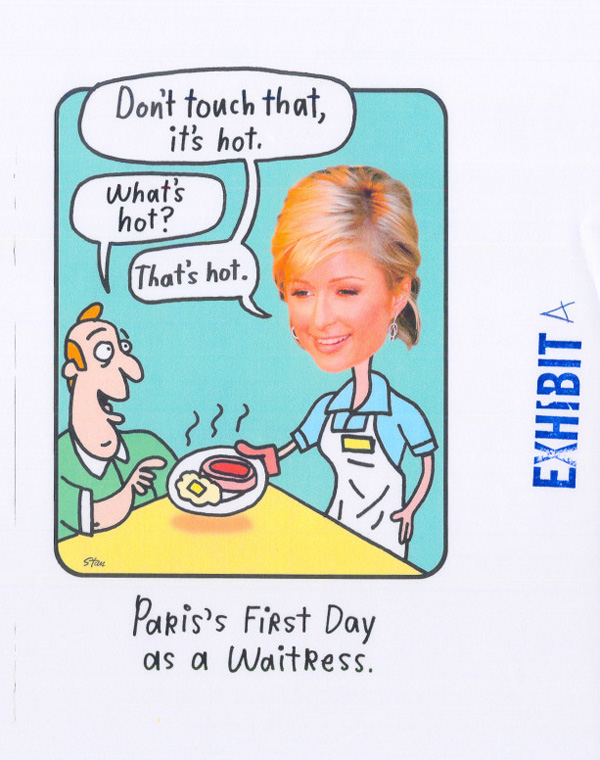 Hallmark’s “Paris Hilton” card. Photo credit: The Smoking Gun
Hallmark’s “Paris Hilton” card. Photo credit: The Smoking Gun
The Ninth Circuit yesterday found in favor of Paris Hilton in her suit against Hallmark Cards for violating her Lanham Act rights and right of publicity by publishing a birthday card with an image of her face and using her THAT’S HOT registered trademark without her permission.
After dispensing with Hallmark’s motion to strike based on California’s anti-SLAPP (Strategic Lawsuit Against Public Participation) statute, the court affirmed the Central District of California’s denial of Hallmark’s motion to dismiss Ms. Hilton’s Lanham Act and right of publicity claims, and remanded the case back to district court. There is some good “transformative” analysis here, a la Winter v. DC Comics, 69 P.3d 473 (Cal. 2003).
“To be sure, there are some differences between the waitressing Hilton does in the ‘Simple Life’ episode and the portrayal in Hallmark’s card. Hilton’s uniform is different, the style of the restaurant is different (drive-through service rather than sit-down service), and the food is different (burgers-and-fries rather than diner-style bacon and eggs). In the card, the body underneath Hilton’s over-sized head is a cartoon drawing of a generic female body rather than a picture of Hilton’s real body. Finally Hilton’s catchphrase appears consistently in its familiar, idiomatic meaning. Despite these differences, however, the basic setting is the same: we see Paris Hilton, born to privilege, working as a waitress.
“We need not decide whether these differences render Hallmark’s card transformative. They are far afield from the total, phantasmagoric conversion of the musicians into the comic book characters at issue in Winter. Although the evocation of the real-life musicians in that case was ‘less than subtle,’ they were ‘merely part of the raw materials from which … a larger story, which is itself quite expressive,’ ‘w[as] synthesized.’ There is no larger story here, just a spoof on a scene from Hilton’s television program. That Hilton’s body is a cartoon representation of a human being in a waitress’s outfit, instead of a photograph of Hilton’s actual body, does not suffice to analogize this case to Winter. The cartoon representations in Winter were of ‘half-human, half-worm’ characters. Hilton’s cartoon body is that of a generic woman. Finally, the worm-like versions of the musicians in Winter did things that the actual musicians did not do, such as ‘engage in wanton acts of violence, murder, and bestiality for pleasure.’ The version of Hilton in Hallmark’s card, however, does almost exactly what Hilton did in ‘The Simple Life’: she serves food to restaurant customers. Even if one adds the literal use of Hilton’s catchphrase, this case strikes us close factually, unlike Winter.
“We do not hold that Hilton is entitled to judgment as a matter of law, something she has not asked for. We merely hold, construing the facts — here, the greeting card and the video — in her favor, that she has at least some probability of prevailing on the merits before a trier of fact.”
The case cite is Hilton v. Hallmark Cards, __ F.3d. __, 2009 WL 2710225, No. 08-55443 (9th Cir. Aug. 31, 2009).